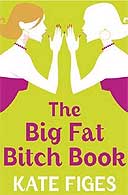
The Big Fat Bitch Book
by Kate Figes
Virago £9.99, pp288
Being a bitch is a tricky business. Dorothy Parker at the Algonquin? Good. Jade Goody in the Big Brother house? Bad. Bitching is confusing because it's only funny when it's cruel. It can be a social necessity and a bonding tool. But it easily oversteps the mark into verbal violence. Figes's funny, intelligent book steps right into this timely problem. Bitching at its best, she explains, is an art form. Take Margot Asquith's retort to Jean Harlow, who kept mispronouncing her name: 'My dear, the 't' is silent, as in Harlow.' Or Joan Crawford to Ingrid Bergman: 'Ingrid, darling, I simply adore your dress. Did you make it yourself?' Or, my favourite (sadly not in this book), Marie (Carrie Fisher) to Sally (Meg Ryan) in When Harry Met Sally, on Harry's new girlfriend: 'Blonde. Big tits. Your basic nightmare.'
At its worst, though, bitching is malicious without being amusing and makes its originator look stupid, jealous or just plain nasty (step forward Jade, Danielle and Jo). One of the aims of this book is to celebrate good bitching and find a way to steer yourself (and your daughters: Figes is mother to two teenage girls) away from the path of temptation that leads to bad bitching.
Bitching is, of course, a feminist issue. Men bitch and behave like bitches - but when they do it, it's called sarcasm, wit or self-assertion. Only women get called bitches. This, explains Figes, is a modern invention: the word dates from the 14th century, but until a century ago it was used rarely and exclusively to denote promiscuous behaviour. Only in the 20th century, as women gained more power and influence, did it come into frequent, general use, meaning 'a malicious, treacherous or unpleasant woman'.
Figes argues persuasively in her introduction that there has never been a better time to take bitching seriously. Cattiness, she argues, is increasingly part of popular culture, and celebrity culture in particular. She contends that women's post-feminist status is uncertain: in times of difficulty women criticise each other to shore up their own positions, and men turn on women to exploit their weaknesses. There are social, biological and evolutionary reasons for bitching: when women are at their most fertile, they are apparently also at their nastiest, pointing out the deficiencies of our rivals, making themselves seem more attractive (and we are not the only females to do this).
There is some serious examination here of why nastiness has its place, but it doesn't get too much in the way of what I suspect most readers will come here for: some good bitching. There is an excellent (but, at eight pages, way too short) chapter on feminist spats. Relive in full the mad and hilarious fax exchange between Julie Burchill and Camille Paglia (Paglia: 'You seem trapped in juvenility'; Burchill: 'Fuck off, you crazy old dyke') and the original 'bird's-nest hair, fuck-me shoes' quote from Germaine Greer to Suzanne Moore ('So much lipstick must rot the brain').
Obviously there is chapter and verse on Joan Crawford and Bette Davis (Davis on Crawford: 'She slept with every male star at MGM except Lassie'; Crawford on Davis: 'Poor Bette. It appears she's never had a happy day - or night - in her life'). Recommendations for 'top bitch viewing' and 'top bitch reading' abound, as well as examinations of women-scorned bitchery, mother-daughter ugliness and sisterly hate.
Then suddenly the book turns upside down. Flip it over halfway through and it becomes a book for teenagers, not grown-up bitches. This is a sweet enough ploy and gives Figes a chance to lay into the more modern, low-rent quips which will appeal to the Heat generation (Anne Robinson's worst put-downs on The Weakest Link, Jordan and Jodie Marsh comparing fake breasts unfavourably). There are lots of interviews here with teenage girls about how and why they bitch, plus advice on what to do if you feel bullied and/or drawn into bitching. This gives the book the feel of a mixed-up scrapbook: a history of bitching, a self-help manual and an academic analysis all at once, but somehow, by and large it succeeds.
The self-help section might be the most useful for Jade, although memorising a few Mae West and Joan Rivers lines wouldn't hurt either. At least if she doesn't mend her ways, she'd have some classier ammunition.

